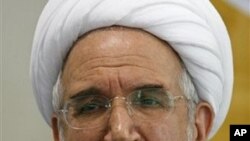An Iranian opposition website says authorities have detained the son of opposition leader Mehdi Karroubi.
According to Mehdi Karroubi’s website, security forces entered the home of his son, Ali Karroubi, on Monday night and arrested both he and his wife, Nafiseh Panahi. The website Sahamnews said she was later released but that there was no further news of Ali Karroubi.
Barak Seener is an Iran analyst with a London-based defense and security research group, the Royal United Services Institute.
"It's actually really surprising that he was arrested because his voice in the opposition is very minimal if at all,” Seener said. “This just shows the extremes that the regime is going just not to blink."
Mehdi Karroubi is a leader of the opposition Green Movement in Iran. He and another opposition leader, Mir Hossein Mousavi, have both been under house arrest for more than a week since calling for their supporters to demonstrate in support of the popular uprisings that ousted the leaders of Egypt and Tunisia.
Demonstrations did take place in Iran’s capital Tehran and other locations on February 14. Security forces confronted the protesters and at least 150 people were arrested.
Katerina Delacoura, an Iran expert at Britain’s London School of Economics, says house arrest is just one of the tactics used by the Iranian government to try to crush the opposition movement.
"It is effective and I think it's part and parcel of the wider approach that the regime is taking at the moment,” said Delacoura. “They are using very, very familiar methods that dictators across the region have used and continue using at present and house arrest, of course, is one of them."
The Iranian government has itself voiced support for popular revolts in the region.
On Tuesday, Iran criticized a deadly crackdown against demonstrators in Libya. Foreign Ministry spokesperson Ramin Mehmanparast described the Libyan uprising as part of a regional "Islamic awakening."
Delacoura says Iran has tried to link regional upheaval to its own revolution in 1979, when Shah Mohammed Reza Pahlavi was overthrown.
"The origins of the regime are in the Iranian revolution,” Delacoura said. “And the Iranian revolution of 1979 represented the will of the people, or so was the claim, so the initial makings of this regime are connected with popular legitimacy and even democratic demands. So I think it's that kind of image that they want to promote in the region by celebrating regime change in many parts of the Arab world."
She says she thinks few people in Iran believe the government’s rhetoric.








